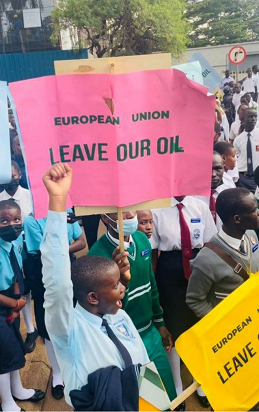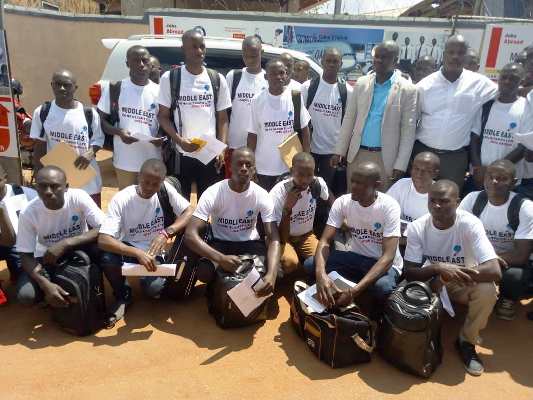Part of the student procession to the EU Delegation Offices in Kampala.
Still recovering from embarrassment after being made to look irresponsible before parents, several headteachers are blaming top leaders of the Uganda National Student’s Association leaders (UNSA) for duping them into using their students for personal gains when they tricked them into demonstrating against a resolution by the European Parliament.
Demonstrations tend to be dangerous and some lives have been lost in the past.
On Thursday, a group of students from various schools marched around Kampala and Hoima streets holding placards and banners against the European Parliament’s resolution that is seeking to delay construction of the East African Crude Oil pipeline (EACOP).
Students who took part in the protests were drawn from schools such as Mengo SS, Nabisunsa girls, Bombo Army Secondary School, Standard High-Zana, Wempewo Ntake SS, Kyambogo college, St Mary’s Vocation Institute, Nabumali SS, Kawempe Muslim among others for the Kampala protest, and from Bwikya Islamic, Kitara SS, Premier SS, and Hoima School of Nursing and Midwifery in Hoima.
Alice Birungi, the headteacher of Bombo Army Secondary School, says that the events at Kololo were orchestrated by the leadership of the UNSA and that their students were used as puppets.
“They sent us letters inviting students for prefects’ meetings, but we were taken aback when we noticed our students marching, demonstrating with placards,” Birungi said. “Parents called us to check whether we had allowed their children to attend the protests, but we had no answers!”
Edward Ssekiziyiu, the deputy head teacher of Wampewo Ntake Secondary School, says that UNSA duped headteachers saying that student leaders had been invited for meetings with the president and student leaders. Ssekiziyivu adds that they also arranged for prefects to attend the meeting with a small group of staff members but the event that followed shocked them.
Ssekiziyiu who was quoting reports from his staff added that when learners arrived at Kololo, they were informed that the president was busy attending a particular meeting but the prime minister had been delegated to meet them.
He adds: “This lie was soon to be changed as UNSA leaders began manipulating learners into protesting. Our staff attempted to prevent students from participating in the protest, but the children had already been aroused. You already know that secondary students hold such UNSA leaders in high regard and trust them.”
Ssekiziyiu believes it was irresponsible to lure students into protesting in front of school administrators. He continues by saying that despite the fact that the rally was police-guarded, he it impossible to foresee situations in which students would be hurt given the kind of protests that often take place in Kampala.
Our reporter was able to access an invitation letter written by UNSA to headteachers. However, this particular letter didn’t mention of a meeting with the president but expressly asked headteachers to send 20 student leaders for a meeting to discuss education and other issues of national importance.
A letter signed by Toskin Cherukut, the UNSA executive secretary reads in part: “They should be accompanied by a school patron. UNSA shall take charge of their welfare and refreshment but the schools shall be in charge of transporting the students. The theme of the meeting is; Education for liberation of Africa and national development. The guest of honor shall be the Rt Hon Prime Minister of Uganda.”
Who brought the idea?
One would wonder why students would choose to demonstrate against this specific problem at this specific time given all the severe challenges they are facing at school, such as rising school fees, a lack of teachers, classrooms, and educational supplies, among others. However, URN has learned this was not a students’ council call.
According to Abius Bakashaba, the UNSA coordinator for the Wakiso district, the national executive members were the ones who first proposed the concept, claiming that it was their responsibility as students to further this worthy cause because it affected both students and the country.
“They said that postponing the EACOP project had an immediate impact on the pupils. Numerous students receive financial aid from oil firms for their schooling. Many people in the oil-related fields are undergoing training, while others have already completed their education and are looking for work,” Bakashaba told our reporter.
Bakashaba added that during the first meetings they had suggested having students from all over the country but it was ultimately decided to have two demonstrations; one in Kampala and the surrounding areas and the other in Hoima, the location of the oil wells.
A teacher who attended the meeting in Kampala says he was astounded by the preparedness at Kololo.
“That day, everything smelled fishy,” the teacher, who requested to remain anonymous stated. “UNSA has written to police multiple times expressing a desire to stage demonstrations in support of various causes, but none of them have ever been permitted. This time, I’ve been told by the police that it was accepted the day it was delivered. the placards and banners were prearranged and enough for all the demonstrators.”
Talking about the issue, Yusuf Werunga, the UNSA president, said they didn’t trick anyone as all they did was on the agenda of the day. He also added that UNSA leadership did not coerce any student into joining the protest but rather explained to them and those who were convinced chose to join by choice.
Werunga also defended the need to protest against the EU resolution saying that as students they have a right to defend the country’s interest given the fact that when such interests are fulfilled the students and the education sector benefit.
Meanwhile, when our reporter asked who paid for the day’s expenses at the two events; in Kampala and Hoima, amid allegation of having been bank rolled by government and the oil companies.
UNSA leaders said that they used part of subscription fees contributed by students to this national body.
-URN





